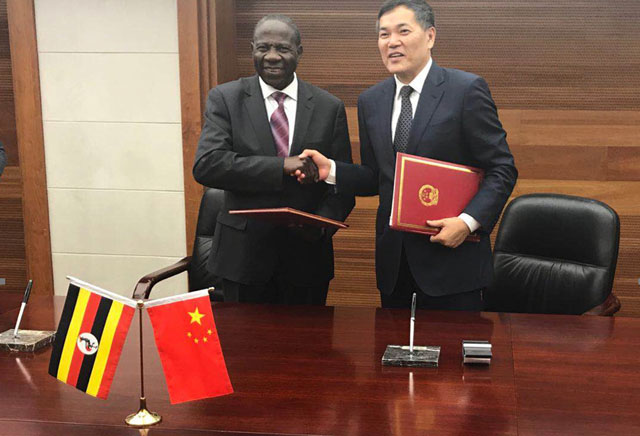
Freetown, Sierra Leone | AFP | It was a time for smiles and handshakes as the delegations from Sierra Leone and China Exim Bank sealed a loan to provide the impoverished West African state with a new airport.
Just months later, the much-trumpeted Mamamah International Airport scheme, estimated to cost $400 million (347 million euros), has gone up in smoke.
Sierra Leone’s new government has scrapped the contract, bluntly declaring it “uneconomical”. Instead it will use an existing, underused airport and improve access to it.
The decision coincides with concern internationally about Africa’s mounting debts with China — fears that are sometimes voiced by individual Africans, but rarely their governments.
“We need Chinese development, but not at the expense of our unborn children who will be paying the debts,” said Hassan Dumbuya, a taxi driver using a partly-completed Chinese-built toll road between Freetown and Masiaka.
– No revolt –
So is Sierra Leone’s U-turn on the airport the dawn of an African revolt against Chinese-funded projects?
Not so fast, say analysts.
“It’s not a revolt because African countries cannot revolt — they are seeking finance,” said Ivorian political analyst Jean Alabro in Abidjan.
Michael Kottoh, managing partner at Konfidants, an international consultancy firm, explained that the airport cancellation had a limited, local, context.
True, it could be seen as “yet more evidence that many African governments are rushing to grab Chinese deals without seeking serious transaction advice to guide their negotiations,” he told AFP.
“That said, this particular airport project cancellation is more about local politics and less about any major policy shift on China by the new government.”
During the campaign for presidential elections in March, opposition champion — and eventual victor — Julius Maada Bio blasted Chinese-funded schemes as a “sham” that yielded “no economic and development benefits”.
In this light, scrapping the airport may simply be a prelude to deals with China which align with Bio’s electoral promises, Kottoh told AFP.
“The country’s China portfolio mix will merely change; the portfolio itself will not shrink significantly,” said Kottoh. “It might even increase in size and value in the long run.”
China is likely to be in pole position if Sierra Leone opts to built a bridge to the older airport, which lies across an estuary — a scheme the press have said could cost more than $1 billion.
– Debt –
China’s role in Africa has expanded with its stratospheric rise as an economic giant over the last two decades.
According to data compiled by the American Enterprise Institute (AEI), a conservative thinktank and economic research organisation, Chinese foreign investment and construction between 2005 and 2018 totalled $1,870 billion.
Of this, $298 billion were placed in sub-Sahara Africa, placing the continent third behind Asia and Europe.
That made China the single largest bilateral financier of infrastructure in Africa, exceeding the combined total of the African Development Bank (ADB), the European Union, International Finance Corporation, the World Bank and the Group of Eight (G8) countries.
China’s biggest investment targets were Nigeria ($49.2 billion), Angola ($24.5 billion) and Ethiopia ($23.6 billion).
Transport infrastructure — roads, railways and bridges — and energy each accounted for a third of the total, followed by mining.
The surge was given a $60-billion boost, including $15 billion in “free assistance and interest-free loans,” at a China-Africa summit in Beijing in September.
With China now accounting by itself for around of fifth of all of African debt, some voices, including the International Monetary Fund (IMF), have worried whether repayment is sustainable.
But Alabro said such fears would be seen by many African governments as overblown, bordering on the hypocritical.
African leaders, he said, realise that their countries can tap a competitive globalised market for funds — and China today is by far the best bet compared with the IMF or bilateral western partners.
Even so, Alabro said, that should not exclude searching questions about these massive deals.
They include contract transparency; legal, technical and ethical safeguards in poor countries; and China’s dominance in managing completed schemes and repatriating the profit.
– Cost vs benefit –
Are the Chinese-funded schemes financially viable? And, to address Bio’s criticism, do they benefit the population as a whole?
Analysts say that the cost benefits of infrastructure projects are typically evaluated over the medium or long term.
This makes it hard to assess a scheme that has only been operational for a few years.
But on the first point, an analysis published last week by France’s ministry of economy and finance said the glut of Chinese funding “increased the risk that economically unviable projects” get financed.
Downturns in economic activity and productivity add to the risk these schemes become white elephants, it said.
On the second point, AidData, an innovative research project at the College of William and Mary in Virginia, used satellite images of Africa at night, using light as an indicator of economic growth, to see how Chinese projects fared.
The results, it said, were encouraging.
Chinese development projects — especially “connective infrastructure” such as roads and bridges — promote equality of growth in areas where they are located.
And they also help to reduce, rather than widen, economic disparities between regions, the study said.
 The Independent Uganda: You get the Truth we Pay the Price
The Independent Uganda: You get the Truth we Pay the Price


